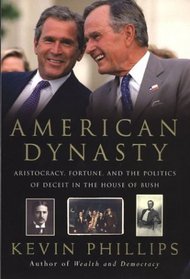Jerome C. (jerome) reviewed American Dynasty: Aristocracy, Fortune, and the Politics of Deceit in the House of Bush on + 13 more book reviews
Helpful Score: 1
Lots of tidbits and analysis of George W. Bush and his influential family, giving a good argument that the Bush family is a dynasty. His father is George Bush Sr., in many offices before becoming president, and grandfather was Prescott Bush. Bush Jr's family legacy may have helped him become president, it sure didn't hurt it.
Phillips brings up the theory of October Surprise, where Bush Sr. allegedly made deals with the Iranians during the embassy hostage crisis. This was to delay their release so as to help elect Reagan over Carter. Reagan was elected, hostages were released when inaugurated, and Bush Sr. became Vice President. He went on to become President. Phillips brings up the interesting point that if this is true, the career of Bush Jr. is owed to an act of deceit.
Of course, there are other reasons for his rise, such as Carters lackluster term, the 60's backlash, implementing the Southern Strategy for the Republican Party that created a white ethnic voter base, the rise of Reaganism, and a shift in foreign policy goals.
It also gives information about the relation of Robert Gates to the Bush family. Bush Jr. after 9/11 signed an executive order limiting public access to presidential papers, and he sent his papers to Texas A&M University, where Gates served as president. Gates was previously CIA director under Bush Sr. This was written about by Phillips in 2004. In 2006 Bush nominated him for Secretary of Defense.
Good resource for anyone wanting to know about the Bush family dynasty.
Phillips brings up the theory of October Surprise, where Bush Sr. allegedly made deals with the Iranians during the embassy hostage crisis. This was to delay their release so as to help elect Reagan over Carter. Reagan was elected, hostages were released when inaugurated, and Bush Sr. became Vice President. He went on to become President. Phillips brings up the interesting point that if this is true, the career of Bush Jr. is owed to an act of deceit.
Of course, there are other reasons for his rise, such as Carters lackluster term, the 60's backlash, implementing the Southern Strategy for the Republican Party that created a white ethnic voter base, the rise of Reaganism, and a shift in foreign policy goals.
It also gives information about the relation of Robert Gates to the Bush family. Bush Jr. after 9/11 signed an executive order limiting public access to presidential papers, and he sent his papers to Texas A&M University, where Gates served as president. Gates was previously CIA director under Bush Sr. This was written about by Phillips in 2004. In 2006 Bush nominated him for Secretary of Defense.
Good resource for anyone wanting to know about the Bush family dynasty.





